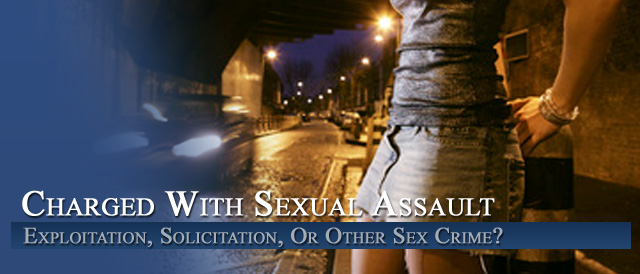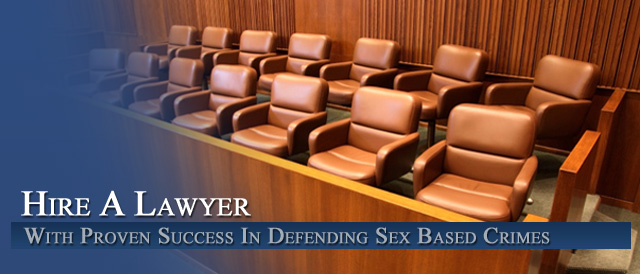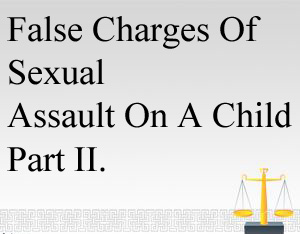




False Charges Of Sexual Assault On A Child – Common In Colorado Domestic Cases Part II of II
By H. Michael Steinberg Colorado Sex Crimes Criminal Defense Lawyer – Email the Author at [email protected]
F alse Charges Of Sexual Assault On A Child – Common In Colorado Domestic Cases Part II of II – This article follows Part I and delves into the result behind the hysteria that surrounds false allegations of child sexual assault in Colorado and elsewhere.
alse Charges Of Sexual Assault On A Child – Common In Colorado Domestic Cases Part II of II – This article follows Part I and delves into the result behind the hysteria that surrounds false allegations of child sexual assault in Colorado and elsewhere.
In a 2011 bibliography of all of the research up to that year entitled Recantation and False Allegations of Child Abuse, authors David N. King, Ph.D. and Maureen Drost, B.A., provide a listing some critically important research done in the filed of False allegations of child abuse.
Here is a link to the article which can be downloaded from this website. Recantations and False Allegations Bibliography (updated).
State of The Research Into Recantation and False Allegations of Child Abuse
This brief article will explores only the very surface of the research covered in the original article. It is strongly suggested that the reader wanting more information locate and read the original article and then follow the citations to the original research from the abstracts summarized in the bibliography.
Why Would Alleged Child Victims Make False Allegations Of Child Abuse?
As stated in the article LINK “the issues pertaining to recantation and false allegations of abuse by children are among the more complex to understand psychologically and to interpret accurately.”
False recounts by children are usually can be the result of one of three different scenarios:
- submitting to suggestion by authority figures;
- “pseudo memories;” or
- are the product of evading honest answers.
The inter-relationship between disclosure, memory, truthfulness, fantastical storytelling, suggestibility, and coaching with recantation …and false allegations is complex.
Sloppy Assessments and Investigations
Assessing allegations of child sexual abuse (CSA) allegations is not only complex and challenging, the high-stakes of an improper investigation that is the result of “sloppy assessments leading to false positive or false negative court decisions are clearly severe.”
Child sexual abuse interviews go astray in two different ways:
- improper interviewing has the potential to elicit false allegations from children, and
- clumsy interviewing which may not produce false allegations, but may have other negative consequences, particularly for child victims.
Substandard child sexual abuse investigations are the result – the consequence of poorly trained professionals and para-professionals who undertake such assessments. For example if the methods used during forensic interviews with children are driven by wrong headed beliefs about how children recall and report child sexual abuse (CSA) to others, the results can be tragic for all.
The theory known as Child Sexual Abuse Accommodation Syndrome (CSAAS) contends that, due to the specific traumatic characteristics of Child Sexual Assault on children, these children will often delay disclosing abuse or altogether fail to disclose during childhood, deny abuse when asked, and often recant abuse allegations. The syndrome suggest a theoretical model that posits that sexually abused children frequently display secrecy, tentative disclosures, and retractions of abuse statements, was reviewed.
Yet despite the lack of research or other empirical support for the theory – CSAAS theory continues to have a tremendous impact on the field of CSA forensic evaluations.
Coaching and “Truth Induction” – The Lack Of Impact Of The Oath To Tell The Truth On Children
One of the studies referenced in the article examines not only the effects of coaching (encouragement and rehearsal of false reports) and truth induction (a child-friendly version of the oath or general reassurance about the consequences of disclosure).
“Children were questioned using free recall, repeated yes . no questions, and highly suggestive suppositional questions. Coaching impaired children’s accuracy. For free-recall and repeated yes – no questions, the oath exhibited some positive effects, but this effect diminished in the face of highly suggestive questions. Reassurance had few positive effects and no ill effects. Neither age nor understanding of the meaning and negative consequences of lying consistently predicted accuracy. The results support the utility of truth induction in enhancing the accuracy of child witnesses’ reports. “
Coaching Children About Sexual Abuse – How To Uncover It
Proper forensic questioning of children alleging sexual assault or other forms of child abuse requires:
(1) the refinement of developmentally sensitive questioning aids that increase completeness without increasing suggestibility,
(2) the development of approaches to non-disclosure and recantation, including understanding of the reasons underlying non-disclosure and the potential for building rapport and increasing trust,
(3) the construction of interventions that meet mental health needs of child-victim witnesses without creating false memories or tainting testimony,
(4) a focus on details of children’s narratives that are often lacking, including temporal information and emotional reactions, and
(5) expanding our attention beyond child sexual abuse allegations in criminal court and considering the many contexts in which child witnesses are questioned, including areas in which preferences rather than memories are elicited.
Improper Versus “Clumsy” Interviewing
Of the two types of interviewing – bad and clumsy – clumsy interviewing is the more common of the two.
Prosecutors, police, and child protection services would do well to keep in mind the following in interviewing possible child victims.
(1) real occurrences and false allegations of sexual abuse are serious and potentially life-shattering for victims;
(2) memory is not perfect;
(3) remembering is facilitated by retrieval cues, contextual support, and the re-experiencing of affect similar to that which occurred at the time of an event;
(4) some people are suggestible under certain conditions;
(5) psycho-therapy can be substandard, as can research;
(6) when a report of memory of sexual abuse first arises in therapy, a neutral and exploratory stance by the therapist should be maintained.
The Role Of “Malice” and “Premeditation”
The difference between false and fabricated reports is critical – false reports may not be premeditated but fabricated reports are always the result of “malice.”
When evaluating new allegations of alleged child abuse – ask:
(1) who was the first to suspect the child had been abused?
(2) how much time was there between the first suspicion and the apparent “confirmation?” and
(3) who did the person making the original complaint share their concerns with, what did they discuss, and how did those discussions influence the child’s claims.
The Effects of Suggestibility On Children’s Memory
Research has demonstrated the effects of suggestibility on children’s memory as follows:
(1) it is easy to distort a child’s memory through leading questions and
(2) once a youngster’s memory has been distorted, the child truly believes the distortion.
How The Child Is Interviewed “Cognitive Interview Techniques” And The Age of The Child
Obviously the age of the child impacts the child’s ability to testify. Age impacts the child’s emotional state and his or her verbal ability.
On one side of the child testimony there is the theory that a therapist or social worker should believe all allegations a child makes since it is not likely youngsters will make false reports of sexual abuse. On the other – professionals should always be skeptical of such claims since young children are more vulnerable to leading questions and erroneous suggestions than older youngsters.
“Among preschoolers, age differences do exist in the potential for suggestibility. This suggestibility can be about “unimportant details,” but it may also lead to fabrication of entire episodes of abuse. Children can be led to make false remarks about individual acts of abuse which professionals may see as proof of sexual abuse or, in a lesser way, embarrassing or painful.”
“The research shows that for children ages 6 and above may or may not be subject to suggestibility, depending in part on pressure put on them by interviewers. Three factors can affect the interviewing process. “
The Barriers
There is a language barrier when interviewing youngsters who are not used to giving elaborate verbal explanations about their experiences.
There is a cognitive problem that emerges when children are asked to remember events from years ago, and the child may have trouble recalling the details.
Children may find it difficult to report information about embarrassing, painful, or stressful events.
What Goes Wrong When Interviewing Children – The Impact Of Repeated Interviews
Repeating questions within interviews and the obvious effect of multiple interviews “impact and reduce the accuracy of youngster’s claims.” Biased professionals then rely on tainted answers that are the direct result of poor questioning technique and the result is skewed reports.
“Repeated questions and multiple interviews demonstrate a child interviewer’s bias and the youngster learns HOW to answer questions to meet the professional’s expectations.”
Many methods used to interview youngsters are not acceptable and experienced lawyers can impeach these witnesses at trial the interviews violate national guidelines for interviewing that require professionals to be open-minded.
The Major Factors That Effect Suggestibility In Children
The major factors that effect suggestibility in children include:
-
- age differences in memory,
- children’s smaller knowledge base,
- language skills that are less developed,
- the youngsters’ ability or inability to distinguish fantasy from reality,
- social factors such as young children’s tendency to be compliant with adult interviewers,
- and outright lying issues
Children may have a number of motivations that may encourage lying; these include:
-
- evading punishment,
- playing a game described as an adult interviewer as a secret,
- keeping a promise,
- attaining personal gains such as rewards,
- acceptance by peers,
- and avoiding embarrassment.
The effects of being interviewed by “powerful” adults such as police officers, medical personnel, and judges in their attempts to “create rapport” may result in the children going along with adults’ wishes which may included the adults’ beliefs in their stories.
A Memory Framework
Memory processes among children can be placed into a framework. This “framework” contains four basic themes:
(1) all details are not stored in a youngster’s memory,
(2) the information that does go into memory may vary in strength,
(3) the status of details in memory changes over time, and
(4) memory retrieval is imperfect. In the context of these themes, the authors discuss factors that can make an impact on children’s memory.
Summary – Why It Happens
False disclosures usually occur in seven situations:
1. The parent, usually the mother, who “brainwashes” the child in an effort to punish her spouse and exclude him from contact with the youngster;
2. A delusional mother influences the child by projecting her sexual fantasies onto the spouse;
3. A youngster who bases his allegations on sexual fantasies instead of reality;
4. The child who seeks revenge against the father by falsely accusing him;
5. Third parties who initiate false allegations;
6. The child who feels influenced because of exposure to the testimony of other youngsters in preschool and day care settings; and
7. The child who has certain medical problems that account for physical findings or that increase concerns among adults.
As noted – this area is complex and still developing. This article only scratches the surface of the bibliography and the bibliography is only a summary of the research that has been done and is being done. I hope you have found this information helpful.
False Charges Of Sexual Assault On A Child
ABOUT THE AUTHOR: H. Michael Steinberg – Email The Author – A Denver Colorado Sex Crimes Criminal Defense Lawyer – or call his office at 303-627-7777 during business hours – or call his cell if you cannot wait and need his immediate assistance – 720-220-2277.
If you are charged with A Colorado crime or you have questions about False Charges Of Sexual Assault On A Child, please call our office. The Law Offices of H. Michael Steinberg, in Denver, Colorado, provide criminal defense clients with effective, efficient, intelligent and strong legal advocacy. We can educate you and help you navigate the stressful and complex legal process related to your criminal defense issue.
 H. Michael Steinberg, is a Denver, Colorado criminal defense lawyer with over 40 years of day to day courtroom experience – specializing in Colorado Criminal Law along the Front Range. He will provide you with a free initial case consultation to evaluate your legal issues and to answer your questions with an honest assessment of your options. Remember, it costs NOTHING to discuss your case. Call now for an immediate free phone consultation.
H. Michael Steinberg, is a Denver, Colorado criminal defense lawyer with over 40 years of day to day courtroom experience – specializing in Colorado Criminal Law along the Front Range. He will provide you with a free initial case consultation to evaluate your legal issues and to answer your questions with an honest assessment of your options. Remember, it costs NOTHING to discuss your case. Call now for an immediate free phone consultation.
Helping Clients To Make Informed Decisions In the Defense of Colorado Criminal Cases.
Contact A Lawyer with Three Decades of Experience as a Denver Criminal Attorney at The Steinberg Colorado Criminal Defense Law Firm today.
Colorado Defense Lawyer H. Michael Steinberg provides solid criminal defense for clients throughout the Front Range of Colorado – including the City and County courts of Adams County, Arapahoe County, City and County of Boulder, City and County of Broomfield, City and County of Denver, Douglas County, El Paso County – Colorado Springs, Gilpin County, Jefferson County, Larimer County, and Weld County,…. and all the other cities and counties of Colorado along the I-25 Corridor… on cases involving …False Charges Of Sexual Assault On A Child.
Other Articles of Interest:
- False Charges Of Sexual Assault On A Child – Common In Colorado Domestic Cases Part I of II
- Colorado Domestic Violence and Sexual Assault Trials – The Use of Evidence of Prior Bad Acts at Trial Under Rule 404 B – Unjust Use of the Colorado Rules of Evidence “Tipping the Scales of Justice”
- False Allegations In Acquaintance / Date Rape – Sexual Assault Cases In Colorado – Part I
- Colorado Criminal Law – First – Are We Married? To Understand the Marital Confidentiality Law – You Must Understand the Elements of Common Law Marriage*
- Designing A Strategy to Defend Against False Allegations of Child Sexual Assault – The Basics












